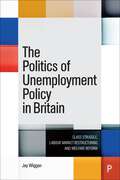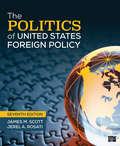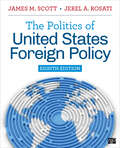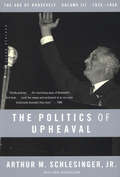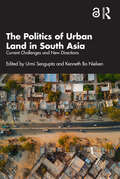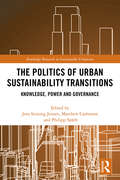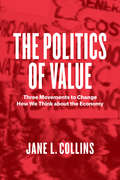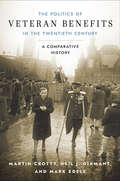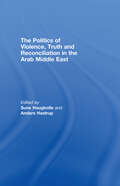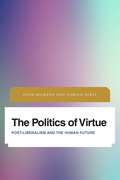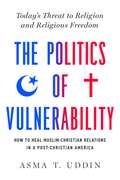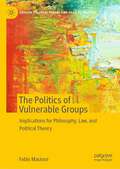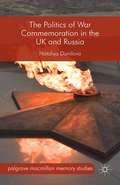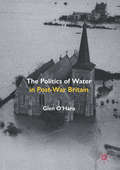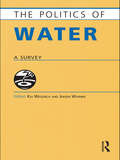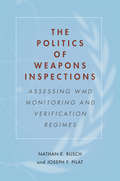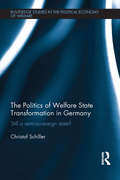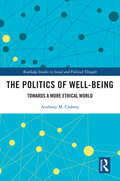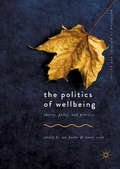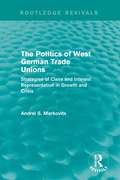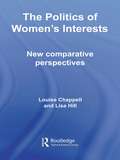- Table View
- List View
The Politics of Unemployment Policy in Britain: Class Struggle, Labour Market Restructuring and Welfare Reform
by Jay WigganThis book provides an account of the evolution of social security and employment policy and governance in Britain between 1973 and 2023. It explains how this remaking of policy and governance shaped, and was shaped by, the transformation of the labour market and power of claimants and workers. Advancing a class-centred explanation, the text situates contemporary working age active labour market policy as the contingent outcome of a long struggle over curtailment of labour autonomy and the challenges arising from policy ‘success’ for securing social cohesion, state legitimacy and better economic conditions for growth.
The Politics of United States Foreign Policy
by James M. Scott Jerel RosatiWhat are the factors that shape and determine the foreign policy choices of the United States? The Politics of United States Foreign Policy helps students consider the players, processes, and politics that drive U.S. decisions and involvement in foreign policy. James Scott and Jerel Rosati emphasize that society, government, and global forces have a role to play in the struggle over competing values when it comes to foreign policymaking. The book discusses historical patterns, the president&’s ability to influence both at home and abroad, and the tension between democracy and national security. Now at CQ Press, the Seventh Edition has been updated to cover developments since the end of the Obama administration, the transition to the Trump administration, the challenges of changing international and domestic contexts, and the increasingly partisan political environment. The authors provide a comprehensive text that blends substance, theory, and stimulating analysis.
The Politics of United States Foreign Policy
by James M. Scott Jerel RosatiWhat are the factors that shape and determine the foreign policy choices of the United States? The Politics of United States Foreign Policy helps students consider the players, processes, and politics that drive U.S. decisions and involvement in foreign policy. James Scott and Jerel Rosati emphasize that society, government, and global forces have a role to play in the struggle over competing values when it comes to foreign policymaking. The book discusses historical patterns, the president&’s ability to influence both at home and abroad, and the tension between democracy and national security. Now at CQ Press, the Seventh Edition has been updated to cover developments since the end of the Obama administration, the transition to the Trump administration, the challenges of changing international and domestic contexts, and the increasingly partisan political environment. The authors provide a comprehensive text that blends substance, theory, and stimulating analysis.
The Politics of United States Foreign Policy
by James M. Scott Jerel RosatiWhat are the factors that shape and determine the foreign policy choices of the United States? The Politics of United States Foreign Policy helps students consider the players, processes, and politics that drive US decisions and involvement in foreign policy. Blending substance, theory, and stimulating analysis, James Scott and Jerel Rosati emphasize that society, government, and global forces play a role in the struggle over competing values when it comes to foreign policymaking. The book discusses historical patterns, the president’s ability to influence both at home and abroad, and the tension between democracy and national security. The Eighth Edition has been updated to cover developments since the end of the Trump administration, the transition to the Biden administration, the challenges of changing international and domestic contexts, and the increasingly partisan political environment. It also incorporates key recent national and international developments, including the global pandemic, the Russian invasion of Ukraine, US global reengagement, and competition between the US and key rivals like China and Russia.
The Politics of United States Foreign Policy
by James M. Scott Jerel RosatiWhat are the factors that shape and determine the foreign policy choices of the United States? The Politics of United States Foreign Policy helps students consider the players, processes, and politics that drive US decisions and involvement in foreign policy. Blending substance, theory, and stimulating analysis, James Scott and Jerel Rosati emphasize that society, government, and global forces play a role in the struggle over competing values when it comes to foreign policymaking. The book discusses historical patterns, the president’s ability to influence both at home and abroad, and the tension between democracy and national security. The Eighth Edition has been updated to cover developments since the end of the Trump administration, the transition to the Biden administration, the challenges of changing international and domestic contexts, and the increasingly partisan political environment. It also incorporates key recent national and international developments, including the global pandemic, the Russian invasion of Ukraine, US global reengagement, and competition between the US and key rivals like China and Russia.
The Politics of Unreason: Right Wing Extremism in America, 1790-1970
by Seymour Martin Lipset Earl RaabThe Politics of Unreason: Right Wing Extremism in America, 1790-1970 is an attempt to explain the history of far right movements through a sociological methodology.
The Politics of Upheaval (The Age of Roosevelt, Vol. III)
by Arthur M. SchlesingerThe Politics of Upheaval, 1935-1936, volume three of Pulitzer Prize-winning historian and biographer Arthur M. Schlesinger, Jr.'s Age of Roosevelt series, concentrates on the turbulent concluding years of Franklin D. Roosevelt's first term. A measure of economic recovery revived political conflict and emboldened FDR's critics to denounce "that man in the White house." To his left were demagogues -- Huey Long, Father Coughlin, and Dr. Townsend. To his right were the champions of the old order -- ex-president Herbert Hoover, the American Liberty League, and the august Supreme Court. For a time, the New Deal seemed to lose its momentum. But in 1935 FDR rallied and produced a legislative record even more impressive than the Hundred Days of 1933 -- a set of statutes that transformed the social and economic landscape of American life. In 1936 FDR coasted to reelection on a landslide. Schlesinger has his usual touch with colorful personalities and draws a warmly sympathetic portrait of Alf M. Landon, the Republican candidate of 1936.
The Politics of Upheaval: The Age of Roosevelt, 1935–1936 (The Age of Roosevelt #3)
by Arthur M. Schlesinger Jr.In the third volume of his series on Franklin Roosevelt, the Pulitzer Prize–winning historian focuses on the turbulent final years of FDR&’s first term.A measure of economic recovery revived political conflict and emboldened Roosevelt&’s critics to denounce &“that man in the White house.&” To his left were demagogues—Huey Long, Father Coughlin, and Dr. Townsend. To his right were the champions of the old order—ex-president Herbert Hoover, the American Liberty League, and the august Supreme Court. For a time, the New Deal seemed to lose its momentum. But in 1935 FDR rallied and produced a legislative record even more impressive than the Hundred Days of 1933—a set of statutes that transformed the social and economic landscape of American life. In 1936 FDR coasted to reelection on a landslide. Schlesinger has his usual touch with colorful personalities and draws a warmly sympathetic portrait of Alf M. Landon, the Republican candidate of 1936.&“One of the most important historical enterprises of our time.&”—Saturday Review &“Vividly portrays…the concluding years of Roosevelt&’s first term…[and] the sweep and excitement of an era more historically dramatic than most.&”—Time
The Politics of Urban Land in South Asia: Current Challenges and New Directions (Cities and the Urban Imperative)
by Kenneth Bo Nielsen Urmi SenguptaCities in South Asia are homes to one of the highest concentrations of people anywhere in the world and the allocation of land and urban resources and the benefits that can be derived from them in this region have become increasingly contested. This book explores the politics of urban land in South Asia and the challenges related to their respective urban futures.For most people, land comes at a premium, and as a result conflicts and contestations over land and urban resources are rife in countries such as India, Bangladesh, Pakistan, Sri Lanka and Nepal, as witnessed in the many struggles of low-income groups and vulnerable or marginalised communities to fight off dispossession or displacement. This book maps current challenges shared across national borders and charts out new directions for future research and land policy. With contributions from emerging and established authors, the book offers a critical accounting of the situation that exists in urban South Asia, while also critically engaging with the current challenges and future directions for land use and land politics.The book will be useful to students and researchers of public policy, development studies, economics, urban and regional development studies, and sociology as well as to policy makers, real estate professionals, and commercial firms engaged in property market/real estate study in Asia.Chapter 10 of this book is freely available as a downloadable Open Access PDF at http://www.taylorfrancis.com under a Creative Commons [Attribution-Non Commercial-No Derivatives CC-BY-NC-ND 4.0 license.
The Politics of Urban Sustainability Transitions: Knowledge, Power and Governance (Routledge Research in Sustainable Urbanism)
by Jens Stissing Jensen Matthew Cashmore Philipp SpäthCities, the world over, are increasingly recognised to be both a principal source of the environmental and social sustainability challenges facing contemporary society and a critical site for addressing these challenges. Socio-technical systems are at the heart of these challenges as they configure central aspects of urban life: from mobility and energy infrastructures to leisure activities and patterns of mobility. This observation has led to substantial interest in how societies might initiate and actively steer radical transitions in these systems in the pursuit of sustainable urban futures. This book contributes to emerging debates on the politics of urban transitions by examining the intimate interlinkages between knowledge, power and governance. Drawing upon real-world examples of urban governance, the authors explore the strategies, struggles and controversies involved in configuring knowledge and how knowledge constructions influence governance by rendering some concerns and issues visible and valuable, while obscuring others. The book draws attention to how novel ways of conceptualising, knowing and observing socio-technical systems may be harnessed productively in redefining the power relationships underpinning unsustainable practices. Understanding these dynamics can ultimately inform and enable new approaches to support much-needed urban transitions. This book provides a compelling examination of urban knowledge politics for the twenty-first century that will be of great value to academics, policy-makers and practitioners working in the social sciences, urban studies, geography, urban governance or sustainability transitions.
The Politics of Value: Three Movements to Change How We Think about the Economy
by Jane L. CollinsThe Great Recession not only shook Americans’ economic faith but also prompted powerful critiques of economic institutions. This timely book explores three movements that gathered force after 2008: the rise of the benefit corporation, which requires social responsibility and eschews share price as the best metric for success; the emergence of a new group, Slow Money, that fosters peer-to-peer investing; and the 2011 Wisconsin protests against a bill restricting the union rights of state workers. Each case shows how the concrete actions of a group of citizens can prompt us to reflect on what is needed for a just and sustainable economic system. In one case, activists raised questions about the responsibilities of business, in the second about the significance of local economies, and in the third about the contributions of the public sector. Through these movements, Jane L. Collins maps a set of cultural conversations about the types of investments and activities that contribute to the health of the economy. Compelling and persuasive, The Politics of Value offers a new framework for viewing economic value, one grounded in thoughtful assessment of the social division of labor and the relationship of the state and the market to civil society.
The Politics of Veteran Benefits in the Twentieth Century: A Comparative History
by Mark Edele Martin Crotty Neil J. DiamantWhat happened to veterans of the nations involved in the world wars? How did they fare when they returned home and needed benefits? How were they recognized—or not—by their governments and fellow citizens? Where and under what circumstances did they obtain an elevated postwar status?In this sophisticated comparative history of government policies regarding veterans, Martin Crotty, Neil J. Diamant, and Mark Edele examine veterans' struggles for entitlements and benefits in the United States, the United Kingdom, Japan, Taiwan, the Soviet Union, China, Germany, and Australia after both global conflicts. They illuminate how veterans' success or failure in winning benefits were affected by a range of factors that shaped their ability to exert political influence. Some veterans' groups fought politicians for improvements to their postwar lives; this lobbying, the authors show, could set the foundation for beneficial veteran treatment regimes or weaken the political forces proposing unfavorable policies. The authors highlight cases of veterans who secured (and in some cases failed to secure) benefits and status after wars both won and lost; within both democratic and authoritarian polities; under liberal, conservative, and even Leninist governments; after wars fought by volunteers or conscripts, at home or abroad, and for legitimate or subsequently discredited causes. Veterans who succeeded did so, for the most part, by forcing their agendas through lobbying, protesting, and mobilizing public support. The Politics of Veteran Benefits in the Twentieth Century provides a large-scale map for a research field with a future: comparative veteran studies.
The Politics of Violence, Truth and Reconciliation in the Arab Middle East
by Sune Haugbolle and Anders HastrupIn the last five to ten years, pressure for political liberalisation, and the growth of civil society and independent media, inside Arab countries have prompted the debate about violent events in the postcolonial period. This book features studies of six Arab countries in which legacies of political violence have been challenged through various initiatives to promote "truth-telling" and transitional justice. The analysis departs from a liberal, teleological understanding of truth and reconciliation as a linear process from trauma through memory to national healing. Instead, the articles highlight how the interplay between state-orchestrated initiatives (such as Truth and Reconciliation committees and ministerial committees); civil society actors (including former political prisoners, investigative journalists and NGOs); and external actors (such as transnational NGOs, state sponsored dialogue initiatives, the UN and the EU) is creating a new political field. The book examines the extent to which this field challenges the Arab nation-state’s monopoly on history and violence, and asks whether public narratives of violence, memory and justice consolidate or challenge political legitimacy of current regimes. This book was published as a special issue of Mediterranean Politics.
The Politics of Virtue: Post-Liberalism and the Human Future
by John Milbank Adrian PabstContemporary politics is dominated by a liberal creed that champions negative liberty and individual happiness. This creed undergirds positions on both the right and the left free-market capitalism, state bureaucracy and individualism in social life. The triumph of liberalism has had the effect of subordinating human association and the common good to narrow self-interest and short-term utility. By contrast, post-liberalism promotes individual fulfillment and mutual flourishing based on shared goals that have more substantive content than the formal abstractions of liberal law and contract, and yet are also adaptable to different cultural and local traditions. In this important book, John Milbank and Adrian Pabst apply this analysis to the economy, politics, culture, and international affairs. In each case, having diagnosed the crisis of liberalism, they propose post-liberal alternatives, notably new concepts and fresh policy ideas. They demonstrate that, amid the current crisis, post-liberalism is a program that could define a new politics of virtue and the common good.
The Politics of Vulnerability: How to Heal Muslim-Christian Relations in a Post-Christian America: Today's Threat to Religion and Religious Freedom
by Asma T. UddinA religious liberty lawyer and acclaimed author reveals the root of America's polarization inside the Muslim and evangelical Christian divide—and how it can be healed.Despite the dire consequences of America's cultural, political, and religious divisiveness, from increasing incivility to discrimination and outright violence, few have been able to get to the core cause of this conflict. Even fewer have offered measures for reconcilliation. Now, in The Politics of Vulnerability, Asma Uddin, American-Muslim public intellectual, religious-liberties attorney, and activist, provides a unique perspective on the complex political and social factors contributing to the Muslim-Christian divide. Unlike other analysts, Uddin asks what underlying drivers cause otherwise good people to do—or believe—bad things? Why do people who value faith support of measures that limit others, especially of Muslims&’, religious freedom and other rights?&’ Uddin humanizes a contentious relationship by fully embracing both sides as individuals driven by very human fears and anxieties. Many conservative Christians fear that the Left is dismantling traditional &“Christian America&” to replace it with an Islamized America, a conspiratorial theory that has given rise to an &“evangelical persecution complex,&” a politicized vulnerability. Uddin reveals that Islamophobia and other aspects of the conservative Christian movement are interconnected. Where does hate come from and how can it be conquered? Only by addressing the underlying factors of this politics of vulnerability can we begin to heal the divide.
The Politics of Vulnerable Groups: Implications for Philosophy, Law, and Political Theory (Critical Political Theory and Radical Practice)
by Fabio MacioceThis book describes and analyzes the conceptual ambiguity of vulnerability, in an effort to understand its particular applications for legal and political protection when relating to groups. Group vulnerability has become a common concept within legal and political scholarship but remains largely undertheorized as a phenomenon itself. At the same time, in academia and within legal circles, vulnerability is primarily understood as a phenomenon affecting individuals, and the attempts to identify vulnerable groups are discredited as essentialist and stereotypical. In contrast, this book demonstrates that a conception of group vulnerability is not only theoretically possible, but also politically and legally necessary. Two conceptions of group vulnerability are discussed: one focuses on systemic violence or oppression directed toward several individuals, while another requires a common positioning of individuals within a given context that conditions their agency, ability to cope with risks and uncertainties, and manage their consequences. By comparing these two definitions of group vulnerability and their implications, Macioce seeks a more precise delineation of the theoretical boundaries of the concept of group vulnerability.
The Politics of War Commemoration in the UK and Russia (Palgrave Macmillan Memory Studies)
by Nataliya DanilovaThis book analyses contemporary war commemoration in Britain and Russia. Focusing on the political aspects of remembrance, it explores the instrumentalisation of memory for managing civil-military relations and garnering public support for conflicts. It explains the nexus between remembrance, militarisation and nationalism in modern societies.
The Politics of Water in Post-War Britain
by Glen O'HaraThis is the first book to cover the British people’s late twentieth century engagement with water in all its domestic, national and international forms, and from bathing and household chores to controversies about maritime pollution. The British Isles, a relatively wet and rainy archipelago, cannot in any way be said to be short of liquid resources. Even so, it was the site of highly contentious and revealing political controversies over the meaning and use of water after the Second World War. A series of such issues divided political parties, pressure groups, government and voters, and form the subject matter of this book: problems as diverse as flood defence to river and beach cleanliness, from the teaching of swimming to the installation of hot and cold running water in the home, from international controls over maritime pollution, and from the different housework duties of men and women to the British state’s proposals to fluoridise the drinking water supply.
The Politics of Water: A Survey
by Kai WegerichThis authoritative reference work gives timely information on the global politics of water. Readers will find case studies on a variety of complex water situations, from the Okavango River that flows through Angola, Namibia and Botswana, to the Euphrates-Tigris of the Upper Persian Gulf. With the current threat of climate change and increasing demand on water resources, the book gives valuable insight into an increasingly politicized topic. Politics of Water is a welcome addition to Routledge’s extensive The Politics of … reference series. Readers will benefit from: essays on major topics in water politics from a variety of contributors (thirteen in all), including Is water politics? Towards international water relations and The politics of water and mining in South Africa sensitive debate on gender issues, reflecting the fact that in many cultures men are responsible for the supply of water, and women as cultivators and house keepers are the major users an A-Z glossary of key terms, issues, organizations, etc. in water politics information on selected major river basins of the world, including maps detailing water consumption and resources. The Politics of Water is a useful guide to the politics surrounding the availability and provision of water on a world-wide scale. It will prove to be a useful reference source for anyone interested in, or studying, the politics of water and climate change.
The Politics of Weapons Inspections: Assessing WMD Monitoring and Verification Regimes
by Joseph Pilat Nathan BuschThe need for effective monitoring and verification of regimes is increasingly urgent in our landscape of "nuclear context" governments, yet the path ahead remains unclear for international non-governmental organizations and monitoring authorities. How should these regimes look? What pitfalls might they encounter? What technologies would prove most reliable for them? How should recent policy developments, such as the 2015 Iran nuclear deal or Syria's renunciation of its chemical weapons, influence their architecture? The Politics of Weapons Inspections presents an evidence-based approach to these questions, systematically studying today's monitoring and verification efforts and offering guidance on how to strengthen them. In addition to examining these regimes' technological, political, and legal contexts, Nathan E. Busch and Joseph F. Pilat reevaluate three recent cases in South Africa, Libya, and Iraq—each representative of a "core type" of verification situation—and apply the lessons learned from them to ongoing debates about North Korea, Iran, and Syria. Finally, based on the evidence presented thus far, they provide a forward-looking set of policy recommendations for the future.
The Politics of Welfare State Transformation in Germany: Still a Semi-Sovereign State? (Routledge Studies in the Political Economy of the Welfare State)
by Christof SchillerHow can we best analyse contemporary welfare state change? And how can we explain and understand the politics of it? This book contributes to these questions both empirically and theoretically by concentrating on one of the least likely cases for welfare state transformation in Europe. It analyzes in detail how and why institutional change has taken Germany’s welfare state from a conservative towards a new work-first regime. Christof Schiller introduces a novel analytical framework to make sense of the politics of welfare state transformation by providing the missing link: the capacity of the core executive over time. Examining the policy making process in labour market policy in the period between 1980 and 2010, he identifies three different policy making episodes and analyses their interaction with developments and changes in such policy areas as pension policy, family policy, labour law, tax policy and social assistance. The book advances existing efforts aimed at conceptualizing and measuring welfare state change by proposing a clear-cut conceptualization of social policy regime change and introduces a comprehensive analysis of the transformation of the welfare-work nexus between 1980 and 2010 in Germany. This book will be of interest to students and scholars of social policy, comparative welfare state reform, welfare politics, government, governance, public policy, German politics, European politics, political economy, sociology and history.
The Politics of Well-Being: Towards a More Ethical World (Routledge Studies in Social and Political Thought)
by Anthony M. ClohesyThe Politics of Well-Being argues that the relationship between well-being and ethical life has been overlooked. The more specific argument of the book is that ethical life requires political engagement, and the emergence of a society committed to critical thinking. It is argued that these conditions allow for our ordination and confirmation as ethical subjects. While well-being can be experienced in different ways, it is claimed that, after experience of ethical life, a more sustainable form of it is revealed to us, a form which we would be drawn to preserve, a form which can be constituted as an object of hope. While the book draws on philosophical themes, its main focus is political. This is because its primary objective is to identify and to examine what needs to be done in order to realise ethical life. Its main focus in this respect is the identification and examination of the barriers which need to be overcome if ethical life is to be realised. It is acknowledged that this will not be an easy task. Indeed, it may be an impossible task. However, despite these barriers, and despite the dark days we are living through, the book is a call to hope rather than a surrender to despair. This book will be of interest to students of politics, psychology, cultural studies, philosophy and sociology, as well as anyone else interested in exploring new ideas about how the make the world a better place.
The Politics of Wellbeing: Understanding The Rise And Significance Of A New Agenda (Wellbeing In Politics And Policy Series)
by Karen Scott Ian BacheThis volume is the first collection in the field of wellbeing studies that places politics centre stage. Through a combination of intellectual inquiry, empirically-grounded research, and investigation across different settings, this book aims to provide fresh insights and develop new lenses through which to understand the rise and significance of the wellbeing agenda. Divided into three parts, it considers how to define wellbeing for public policy; the prospects for wellbeing as a force for political change; and the link between policy agendas and the everyday lives of people. The book explores the key political issues of power, democracy, and the legitimacy of wellbeing evidence in a range of settings – international, national and subnational/substate. The volume will appeal to wellbeing and politics scholars, as well as students and general readers with an interest in these new political agendas.
The Politics of West German Trade Unions: Strategies of Class and Interest Representation in Growth and Crisis (European Trade Unions and the 1970s Economic Crisis)
by Andrei MarkovitsFirst published in 1986, this book assesses the politics of the West German trade unions in the context of their larger role as major actors in the polity. By focusing on the historical realities of the labour movement both before and after 1945, the study explains the extent to which organized labour solidified and challenged the dominant structures of politics and authority. It examines the metalworkers’ union, the construction workers’ union, the printers’ union and the chemical workers’ union and shows how the industrial reality of each organisation helped shape its political outlook and strategic thinking. This book will be of particular interest to students of trade unions, industrial relations and political economy in West Germany.
The Politics of Women's Interests: New Comparative Perspectives (Routledge Research in Comparative Politics #Vol. 12)
by Louise Chappell Lisa HillThis new study reveals how institutional practices and discourses shape the way men and women are conceived of, and how through this process, gender stereotypes and expectations are created. Informed by the latest research and trends, these expert authors examine the way in which domestic and global institutions shape and reflect gender interests and the extent to which feminists can challenge gender norms through political institutions. They examine regional, national and international institutions including the EU, ICC and UN and take a broad view of political institutions to include bureaucracy; federalism; legal structures; parliaments; voting and electoral institutions; and media coverage of women’s involvement in such institutions. Drawing on experiences in the US, UK, Australia, Canada, and New Zealand this book will be of great interest to students and scholars of gender studies, political science and comparative politics.
